On 28 October 1940, acting on orders given by Benito Mussolini, six reinforced Divisions of the Regio Esercito moved south out of occupied Albanian and across the adjoining Grecian border. This action initiated the Greco Italian War. Mussolini’s decision to launch this campaign cannot be looked upon as anything but a tragic folly.
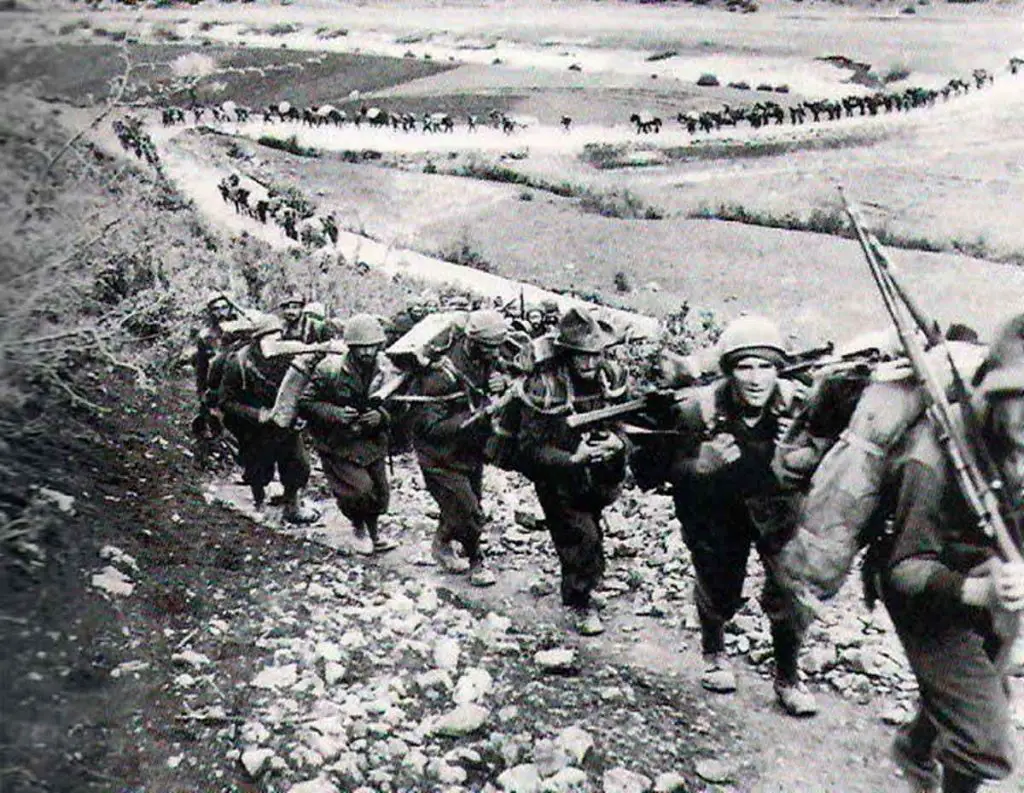
3rd Alpine Division Julia on the march in the Greco Italian War.
A Look at the Initial Failures
One would be hard-pressed to find a campaign on a similar scale as ill-timed and poorly supported on the part of the aggressor as this. The decision to launch the invasion, made in such an unfathomably rushed and off-handed manner, seemed to be based on little more than anger, greed, weak assumptions, and ignorance.
Benito Mussolini ignored sound advice given by members from his General Staff regarding the needed manpower and necessary schedule to prepare and launch a properly-supported invasion. Instead, he became swayed by emotions and pro-war opinions of a few influential individuals who perhaps looked to personally benefit from a successful operation in Greece.
Stating the Italian invasion of Greece failed because of poor logistical and strategic planning over-simplifies the events. It also takes away from the bitter and determined fight of the Hellenic army in defense of its land and people. However, these same failures by Italian policymakers served to bind the Italian soldier to a trajectory destined to fail from the opening days of battle.
In the end, Italy avoided total defeat at the hands of the Greeks. The German military entry into the fight is rightfully identified as the main reason for the eventual victorious outcome of the battle. Nonetheless, the belated arrival of Italian reinforcements, supplies, and equipment restored the equilibrium of the Italian units on its own. These logistical improvements helped lead to the stabilization of the front in January/February of 41’, months before German entry into the conflict. Approximately six months after the Italian invasion of Greece commenced, Italian soldiers marched into a subdued Athens alongside their German partners.
Events Leading up to the Greco Italian War
In the years leading up to the Greco Italian War, there was a tense yet cordial relationship between the political establishments of Italy and Greece. As the world marched towards the Second World War, relations between the two countries began to sour. In the last few months before Mussolini decided to go to war, the Italians instigated an anti-Greek campaign in the press. They even went so far as to sink a Greek naval cruiser in its own waters. The Greek political and military hierarchies, in an attempt to keep peace in the region, covered up the sinking by claiming an “unknown aggressor” attacked the warship, even though they possessed proof an Italian submarine carried out the assault.
Volatility in the Balkans
There were several points of contention between the countries that had lingered for years, two of which were territorial disputes. Both countries had laid claim on the Dodecanese Islands, and as the protectorate of Albania, Italy assumed Albania’s claim to the disputed northern Epirus region of Greece.
The April 1939 Italian occupation of Albania, a nearly bloodless affair, raised concerns inside the Greek government that Italy had stepped up in its intentions of wanting control of the Balkans. To help counter this threat, the Greek military increased their readiness for a war they hoped never materializes. However, they were determined to be ready if called upon.
From the Italian perspective, of particular concern for Mussolini was the British use of Greek airfields and harbors. However, by the fall of 1940, this threat was more imagined than real. Based out of Greece, the bombers and or fighters of the British air force could menace both the Italian mainland and its troops in Albania, something that Il Duce found unacceptable. Furthermore, the British air force, working in conjunction with its own Royal Navy, would be operating out of Greek ports. Their presence significantly threatened the Italian lines of communication across the Adriatic Sea while also denying the Italian navy freedom of movement.
Desiring a New Empire
Mussolini’s desire for another military victory to build his ‘New Empire’ played a significant part in pushing the two countries into war. In the months leading up to the Greco Italian War, Mussolini hoped General Rodolfo Graziani’s forces in North Africa would eventually push across Egypt to the Suez Canal. This push would drive the British from their naval base in Alexandria. Mussolini believed that by seizing the Greek harbors and naval bases, he would not only gain their use for his own Regina Marina but also be able to deny them for the British.
If Italy blocked the British navy from Greece and driven from Alexandria, the Italians would be in a favorable position to seize almost total control of the eastern Mediterranean and “Middle Sea”. In this scenario, Italian supplies flow relatively unhampered to North Africa and the Africa Orientale Italiana. At the same time, the British must then navigate around the tip of Africa to supply its troops in the Middle and the Far East. Even the pesky little island of Malta could be subdued at the Duce’s leisure. To Mussolini, the rewards must have seemed endless.
Ioannis Metaxas
Ioannis Metaxas, who held the title Prime Minister of Greece, was at the helm of political power for his country during the turbulent period of the late 1930s. Metaxas was a clever and calculating man, and arguably also a dictator. He was not cut from the same cloth as Hitler, Mussolini, or Stalin, who looked to expand their empires through military conquests. Instead, Metaxas was content to rule over only his country in an authoritarian manner. Some have compared his ruling style and level of ambition to that of Spain’s Francisco Franco.
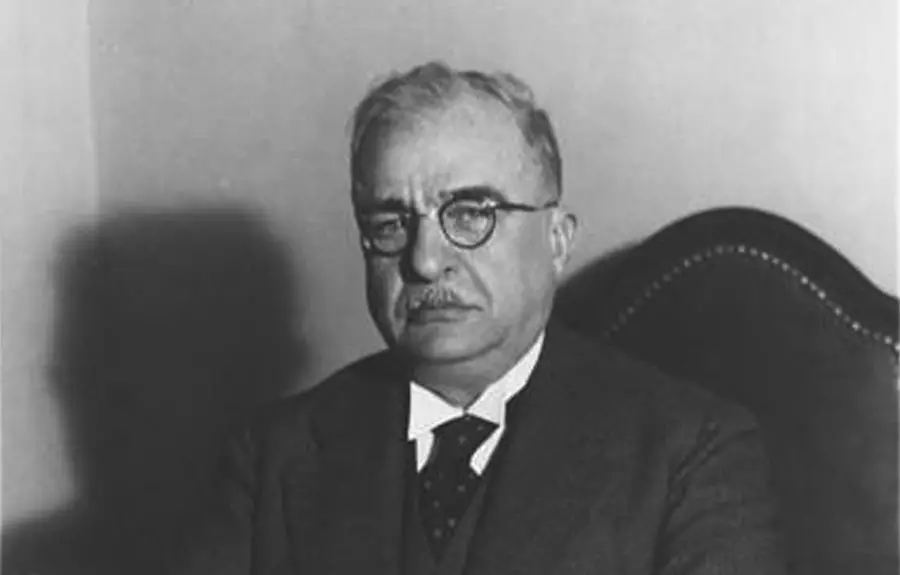
Ioannis Metaxas
Metaxas was considered a Germanophile. His admiration for the Germanic way and their social and military accomplishments was off-putting to many in the Greek political and military elite. Contrarily, the Greek monarchy and military hierarchy were seen as Anglophiles, based in no small part on the substantial presence maintained by the British Royal Navy in the Mediterranean.
Metaxas, weary of Mussolini’s intentions, had, from the beginning of his reign, begun the process of rebuilding and reorganizing the Greek military. While the Greek army was not a juggernaut at the outbreak of the conflict, the advances and material improvements it made under Metaxas’s rule paid dividends once the war began. This newly reconstructed Greek army would also hold the critical advantages that came from fighting in defense of their home soil. The military force the Greeks were able to assemble at on the onset of the hostilities would hold numerical superiority over the Italians for a large part of the conflict. Additionally, the poor weather in the opening months of the war would help eliminate the advantage the Italians held in armor and air power.
Greece Joining the Axis?
Some historians theorize that Metaxas and Greece could have been drawn into the Axis alliance as a partner. The significantly increased with Great Britain’s ability to influence world affairs became further diminished from its pre-war heights.
Mussolini, however, was not looking for a new ally to willingly join the alliance. Nor was he inclined to wait patiently to see how affairs sorted themselves out. The Duce instead craved an Empire founded by the sword, and he was not going to spend time courting a nation to join him as a partner and share in the eventual spoils.
General Alexander Papagos
The man tasked to lead the Greek military in what would prove to be perhaps its finest hour of the 20th century was General Alexander Papagos. Papagos was an able, if not cautious, field commander. He skillfully obtained the upper hand against all three of the Italian commanders he was pitted against during the conflict.
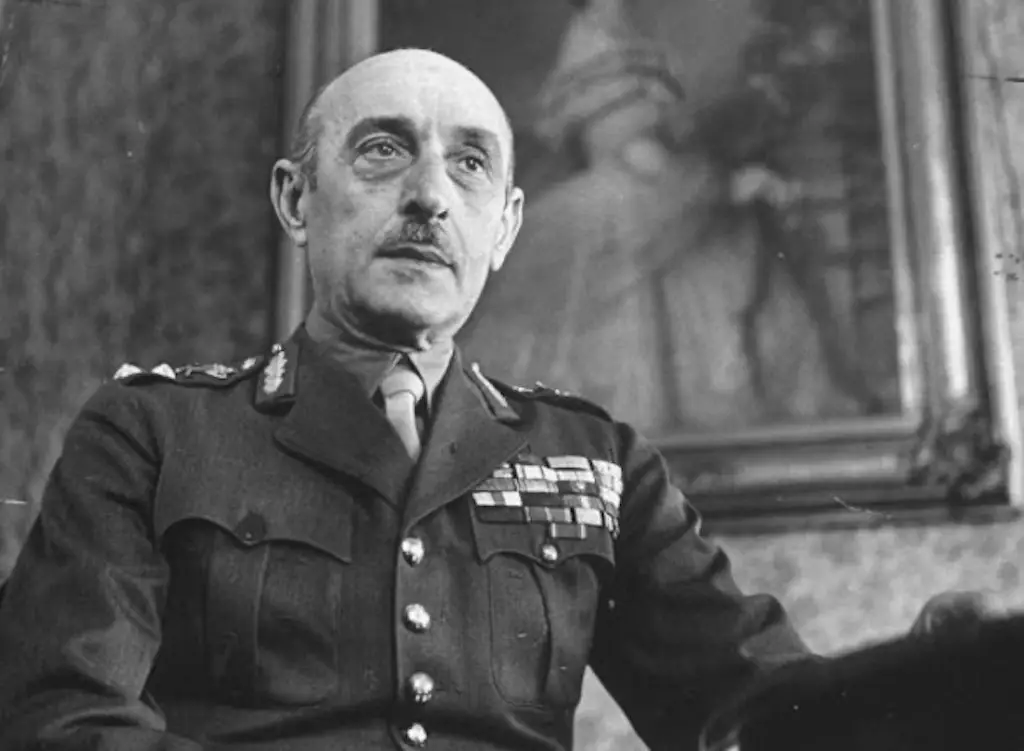
General Alexander Papagos
For the Italians, a small group of powerful men, perhaps either blinded by self-delusion and greed or ignorant to the realities of the situation, used their position and influence to help propel Italy into the war without the proper preparations. Focused on the glory, accolades and riches that come from victory, Count Gian Galeazzo Ciano, Francesco Jacomoni di San Savino, and General Sebastiano Visconti Prasca, apparently gave Mussolini false or exaggerated reports on necessary military strength, supposed disorder in the Greek military, and the mood of Italian troops; all with the hope of convincing the Duce into declaring war.
Mussolini, of course, was all too willing to believe these distorted facts and claims. He favored these statements and analyses over the more cautious and realistic ones he would receive from his General Staff. In the end, as Duce of Italy, it would be his decision alone to commit his country to war with Greece. Thus sending his troops into the distant mountains to meet their fate.
Galeazzo Ciano
As foreign Minister of Italy, and Mussolini’s son-in-law, Count Galeazzo Ciano possessed perhaps more influence and sway over the Duce than anyone else, including Mussolini’s wife and mistress. Ciano once admired the Third Reich. But by the summer of 1940, he felt disdain for Hitler and his policies.
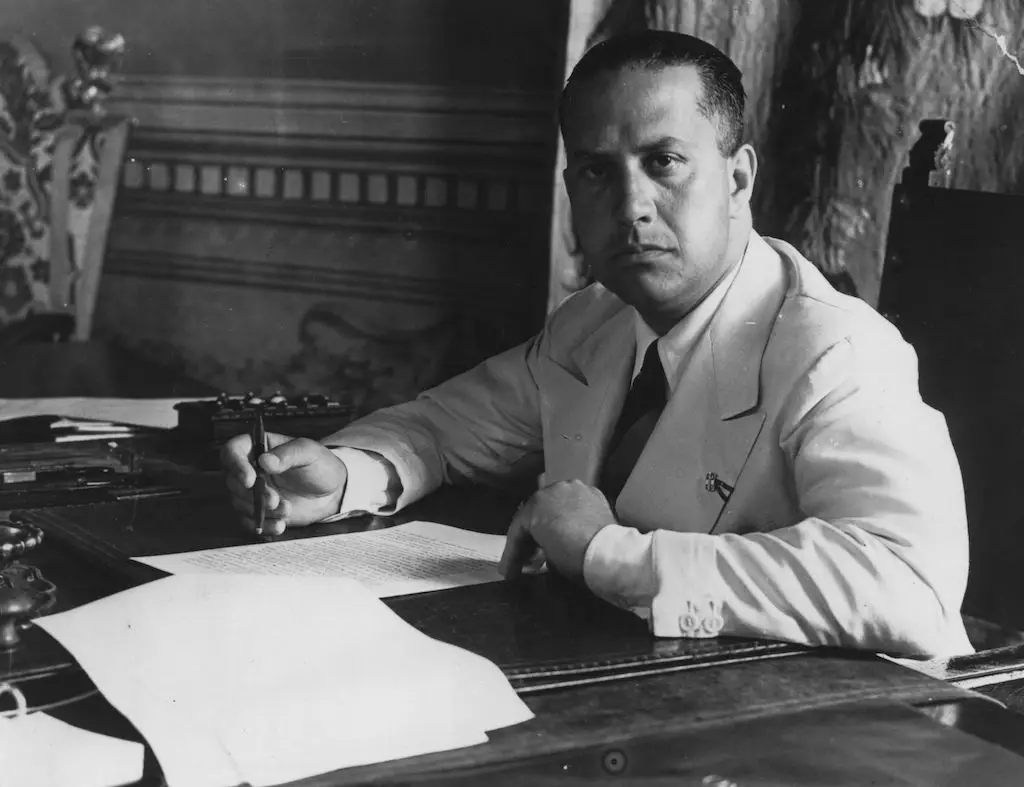
Italian diplomat Count Galeazzo Ciano (1903 – 1944), Mussolini’s foreign minister, and son in law, at work in his office at Rome. (Photo by Keystone/Getty Images)
He, like Mussolini, felt the Balkans are in the Italian sphere of interest. The time had come for his country to exert its influence here.
In the months leading up to the Greco Italian War, Ciano busied himself with half-baked Machiavellian plots concerning Greek political and military leaders. Spending millions of liras to bribe specific individuals, Ciano imagined sowing the seeds of discontent in the circles of Greek power. Ciano envisioned this Greek “fifth Column” basically standing aside or even quietly support the Italians military excursion into their country. This never transpired, of course. The only thing Ciano accomplished was to fill the pockets of several Greeks more than willing to take his money and fuel Ciano’s delusions.
Francesco Jacomoni
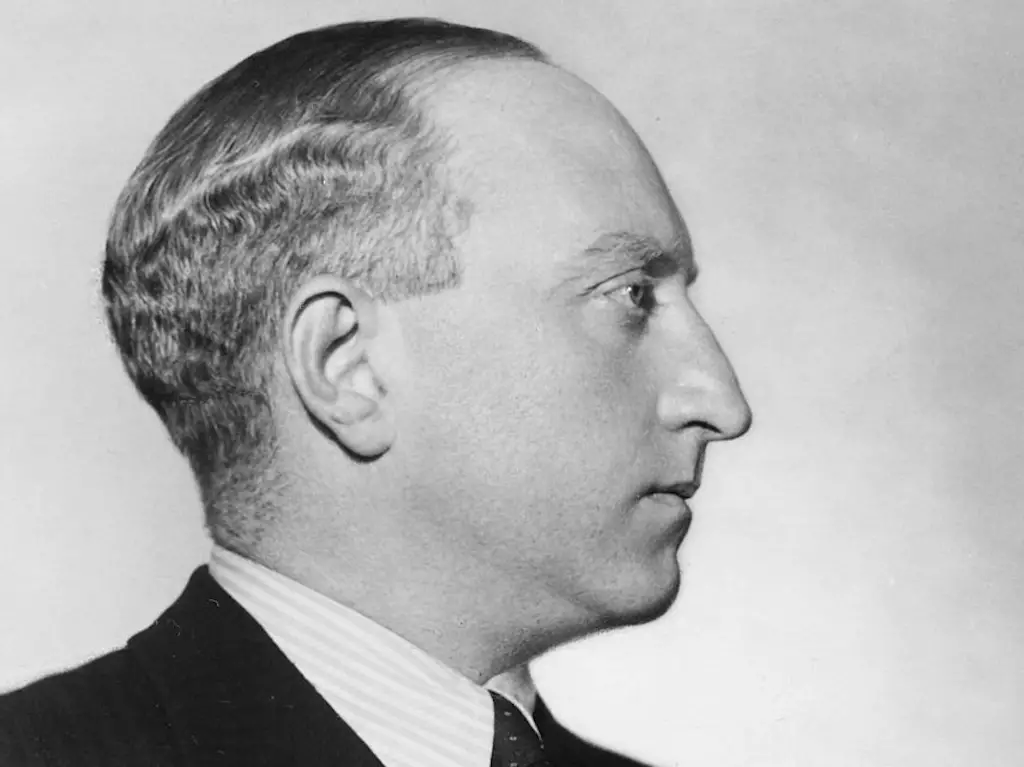
Profile portrait of Italian diplomat Francesco Jacomoni (1893-1973), newly appointed Governor of Albania, circa 1935. (Photo by Paul Popper/Popperfoto via Getty Images/Getty Images)
Joining Ciano in these flights of fancy was Francesco Jacomoni, Italian governor-general of Albania. Since becoming Viceroy of Albania, Jacomoni attempted to foster anti-Greek feelings in Albania. He also attempted to form the foundation for a cross-border resistance movement against the Greek establishment. He repeatedly gave Mussolini glowing and predominantly incorrect reports on the attitude of the Albanians and their desire to fight alongside the Italians. Jacomoni, along with Ciano, knew that an Italian victory would bring them personal wealth. The reports fostered a belief in Mussolini that a victory was likely.
General Visconti Prasca
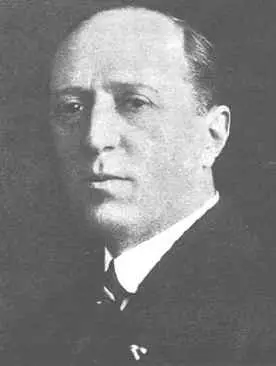
General Visconti Prasca
As commander of Italian forces in Albania, General Visconti Prasca was in a position to have the most realistic grasp on the pre-war military situation. However, it appears that personal ambitions clouded the judgment of a critical Italian decision-maker in their rush to make war with Greece. Prasca, like many Italian officers, dreamed of one day achieving the rank of Marshal of Italy. In the fall of 1940, he believed he found the opportunity to ensure this promotion. Prasca knew that by commanding a ‘victorious’ force in Greece, his promotion would be guaranteed. Prasca also understood that if his Italian force became too large, there was a high probability Mussolini or the General Staff would place a more senior commander in charge of the operation, thus ‘robbing’ Prasca from his glory.
Mussolini asked about the size of the force needed to perform a coup de main of Epirus, and a second advance to seize Athens. Prasca assured Mussolini the nine divisions currently in the theater would be sufficient for the task. Only the addition of a couple of Mountain Divisions and essential support units needed to be added. Incredibly, the man who would begin the Greek campaign as Italy’s theater commander unwittingly hamstrung the Italian effort in an attempt to seize personal glory.
Early Italian Victories
Prior to the invasion of Greece in 1940, Italy achieved several military victories that helped elevate the reputation of its armed forces. The conquest of Ethiopia in 1936 and a strong showing by the forces under General Gastone Gambara in Spain brought glory and respect that Mussolini craved for his military. Conversely, these engagements also served to wear his forces and resources critically thin. Additionally, planners never adequately addressed the flaws exposed in these military campaigns. The cakewalk in Albania in 1939 was followed by an early Italian victory during the opening months of the Second World War over the British in East Africa. Troops fighting under The Duke of Aosta forced British troops to evacuate to the sea as they seized British Somaliland. Thus Mussolini’s ‘Empire’ grew a little bit grander.
Imminent German Victory
On other fronts, Mussolini watched as Hitler’s Germany expanded ‘peacefully’ into Austria and Czechoslovakia. Germany then achieved military victories in Poland, the Low Countries, and France. These events captured the attention of the world, and a frustrated Duce grew jealous. Mussolini lamented “It is humiliating to sit here with our hands folded while others write history.”
The world’s focus was squarely on Hitler and his Wehrmacht. Millions looked on with either fear or admiration at his – Napoleon like conquests across Europe. When France fell in the summer of 1940, the British were forced off the mainland and back across the Channel. The complete domination of Western Europe was within Hitler’s reach with a subdued and battered British Empire. The United Kingdom’s new Prime Minister, Winston Churchill, made it obvious with his eloquent and inspiring speeches, that the British Empire had no intention of capitulating. If Germany wanted to raise the Swastika over the British Parliament, they would have to cross the channel and do so themselves.
Hitler and his staff immediately began making plans to do just that. Germany’s Operation Sea Lion was designed to carry out an amphibious landing and attack against the United Kingdom. Thus, bringing the last remaining western obstacle to Nazi domination under German control. While the Oberkommando der Wehrmacht worked on the invasion preparation, the Luftwaffe began its relentless attack against England in an attempt to both finish off the British air force and break the spirit of the British people.
Italy and the Balkans
As the summer months of 1940 passed by, Mussolini began to fear that the war would soon be over. If he did not move quickly, his ambitious dreams of Italian conquest and territorial gains would be cut short. Just as Mussolini belatedly sent Italian troops into France to ensure a place at the negotiating, he felt the more land Italy fought on and or controlled, the more bargaining power he possesses at the conclusion of the war. Believing the end of the war is imminent, Mussolini pressured Graziani to push forward in Egypt and make contact with the enemy. At the same time, the Duce turned his gaze towards Greece.
Mussolini knew that Hitler would oppose any imminent Italian military operation against Greece. His German ‘partner’ held the exact opposite view on what an Axis involvement in the Balkans should entail. The German position was to avoid bringing the war to this area at all costs. Hitler realized that the Balkans region was a potential tinder box. The Fuhrer feared Italian involvement in Greece would bring the Soviets into the Balkans to advance their agenda.
Germany and the Balkans
The Fuhrer was likewise desperate to keep the fighting as far as possible from his precious oil fields in Romania. The loss of this resource would have a crippling effect on the German war effort. Hitler and his staff had continually pressed Mussolini to concentrate the Italian military efforts on the North African campaign. They urged him to leave the Balkans undisturbed for the time being.
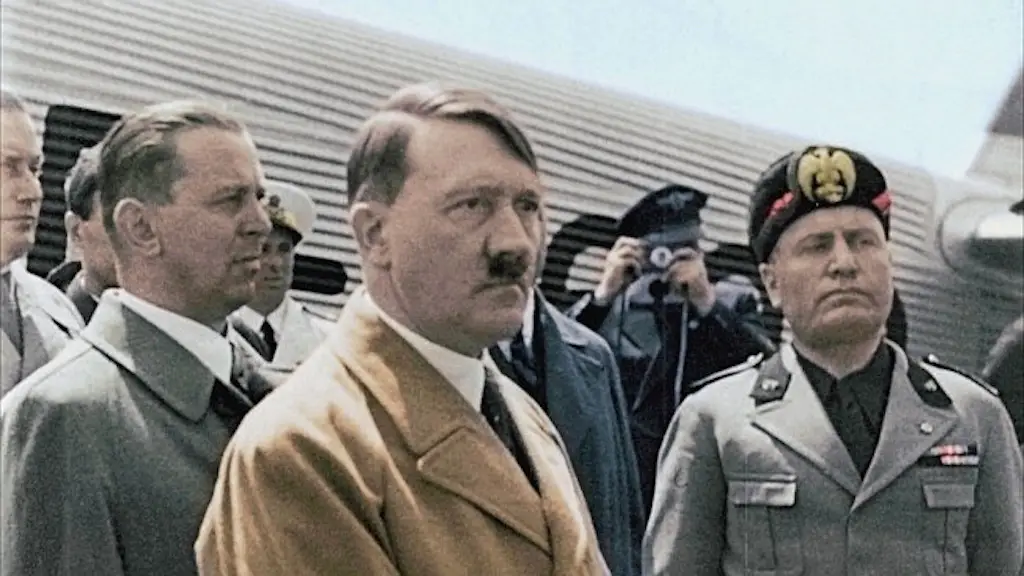
Hitler persuaded Mussolini to avoid a Greco Italian war.
To the Germans, the Balkans were of little interest. But to Italy, the region was of significant importance to its plans. Italy could anchor its efforts to dismantle the newly created Yugoslavian state, which it saw as an obstacle towards advancing its interests. Neutralizing Greece would eliminate the threat of a British presence in the Adriatic. At the same time, raw materials of this area could potentially help Italy’s ability to be more self-sufficient. Mussolini’s planned expansionism required raw materials to fuel the ultimate end game of becoming a real global power.
But by the fall of 1940, it appeared to all that Italy would make no move that year against Greece. Despite the advantages Mussolini felt forthcoming with a victory over the Greeks, he decided to keep his army on the Albanian side of the border. He once again informed Hitler that the Italian focus would remain in North Africa. Besides Hitler feeling relieved with information, many in the Italian General Staff felt pleased with the decision not to attack. Perhaps foremost relieved for the Italians was Marshal Pietro Badoglio, Chief of the General Staff, who was opposed to any actions against Greece for the foreseeable future.
Operation “Emergenza G”
Emergenza G was the Italian operation for the invasion of Greece. The operation called 18 reinforced divisions with the main attack line running from the Korista Depression to Salonika and Athens. This primary portion called for 12 of the allotted 18 divisions to commit to this sector. A secondary parallel offensive aimed towards Yanina would require three more divisions. Meanwhile, three Italian divisions would guard the Yugoslavian border.
By September of 1940, the Italians had less than half of Operation Emergenza G’s required divisions in Albania. But surprisingly, Mussolini ordered the demobilization of 600,000 soldiers to take place between 10 October and 15 November. This assured those in the Italian General Staff, worried of a possible conflict with Greece, that the danger had passed. Italian staff officers now busied themselves with “wintering” the troops in Albania and carrying out the demobilization orders.
German Entry into Romania
On 7 October 1940, German troops entered Romania at the request of Prime Minister Ion Antonescu to help provide ‘security’ for the country. The security Hitler was most interested in maintaining was German use of the Romanian oil fields at Ploesti. Mussolini obtained a letter from Germany on the 11th informing him of the occupation. Once again Hitler had undertaken an important development without first notifying his Axis partner. Mussolini became furious upon reading the letter. Keeping Mussolini in the dark regarding the German attacks in Poland and France humiliated Mussolini. Now Hitler crossed the line with a military occupation of Romania. To Mussolini, Romania is a country in the “Italian sphere of interest’.
Mussolini felt Italy needed to restore the balance of power between itself and Germany. Perhaps more to the point, between Hitler and himself. Ciano recorded in his diary the anger Mussolini felt at Hitler’s latest snub:
“Hitler keeps confronting me with fait accompli. This time I shall pay him back in his own coin; he shall learn from the newspapers that I have occupied Greece. Thus equilibrium will be restored.”
Hitler had inadvertently put into motion exactly the event he wished to avoid, a war in the Balkans.
Order to Initiate Emergenza G
On 14 October 1940, Mussolini summoned General Mario Roatta, Deputy Chief of Staff of the Army, and Marshal Pietro Badoglio, to the Plaza Venezia. He informed them to immediately implement Emergenza G with the initial goal of pulling off a Coup de Main in the Epirus region. With practically no time to prepare, this endeavor must be accomplished with basically the troops on hand in Albania. Completion of the first phase may provide sufficient time for enough reinforcements and supplies to push towards Athens. Mussolini ordered the invasion to take place 26 October 1941 (later moved to the 28th) – less than two weeks away.
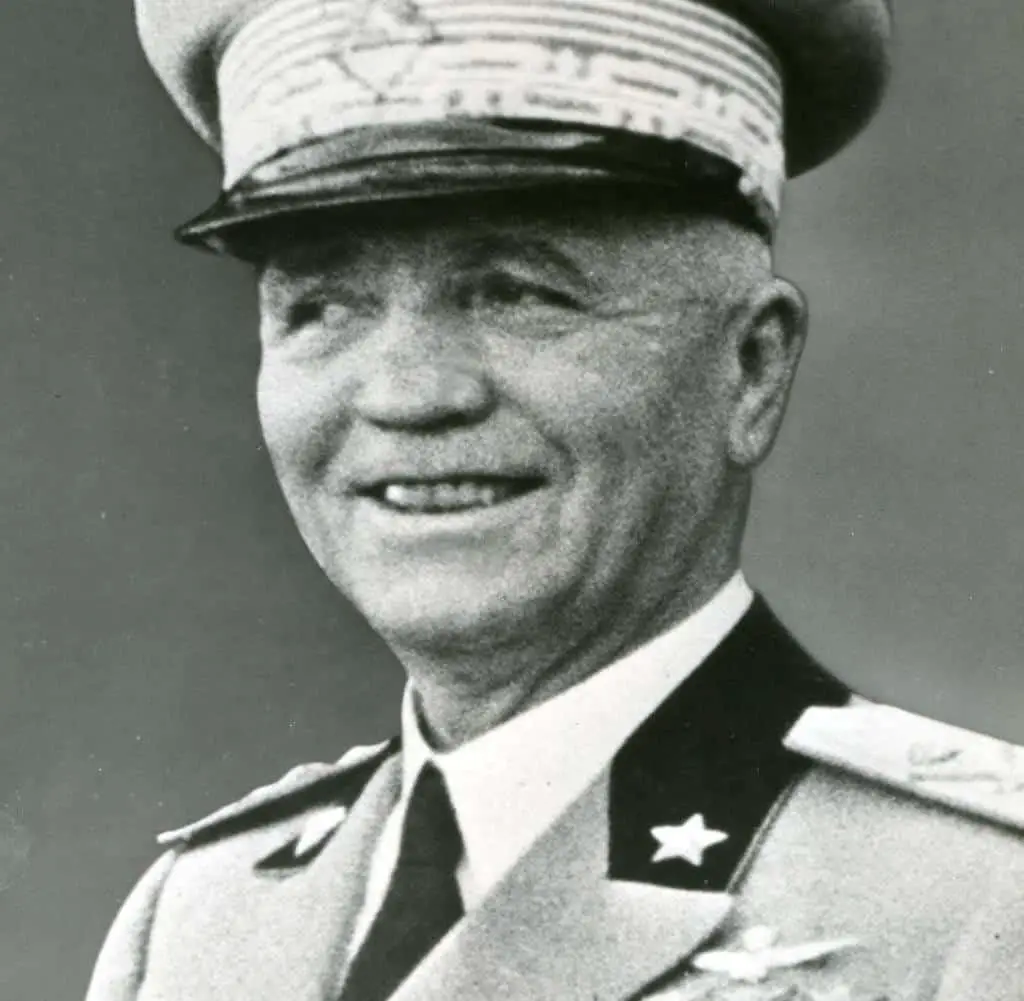
Pietro Badoglio
Roatta and Badoglio were shocked at this development. Roatta advised Mussolini that at least 12 more divisions are necessary for the campaign before beginning the invasion. Preparation and coordination for the operation required at least three months. Badoglio recommended postponing this limited attack against Epirus. He suggested building up the forces for a much grander invasion pushing immediately towards Athens. Badoglio believed dangling a much larger prize might convince Mussolini to grant more time before rushing into the invasion. The Duce would hear nothing of it and ignored these suggestions. His mind was now set on war.
Logistical Nightmare
On 15 October, Mussolini announced to the General Staff the plan to go to war. Incredibly neither the heads of the Italian Navy nor the Air Force was present for this monumental decision. Mussolini decreed that preparations were to begin immediately. A barrage of orders poured out of Rome. They must completely turn a military force easing into a winter hold into one about to launch a major offensive. The magnitude of this endeavor put a strain on Italian logistical capabilities. This decision would almost bring the supply chain to a crashing halt. Months after the invasion began, needed supplies sat on Italian docks and in warehouses due to mismanagement or lack of adequate preparation. Once these supplies reached Albania, a further delay incurred because of a lack of supply vehicles.
The Military hierarchy scrambled to recall hundreds of thousands of men who demobilized just weeks prior. Chaos emerged as soldiers at home with their families must now rush back into service for a multi-front offensive. With the wheels of war in motion, General Presca would get his chance for glory on the battlefield. Mussolini now had an opportunity to get ‘revenge’ for Hitler’s deceptive ways. But in their haste, they would have to confront an opponent better prepared for war.
Targeting the Epirus Region
On 20 October 1940, General Roatta issued a directive (DSCSTA f.4100/SME) spelling out the goals for Esigenza G. The main focus of the operation was launching an offensive to seize the Epirus region from the Greeks. The Epirus area contains the Pindus Mountains. These mountains average nearly 8,700 feet in height and serve as an imposing obstacle separating Epirus from Macedonia. The area also includes the Artachtos River in the east and the sea in the west. The Epirus area, one of the three main regions of the country, helps make the “central” region of mainland Greece. Macedonia and Thrace make up the northern region and in the south, the Peloponnese peninsula.
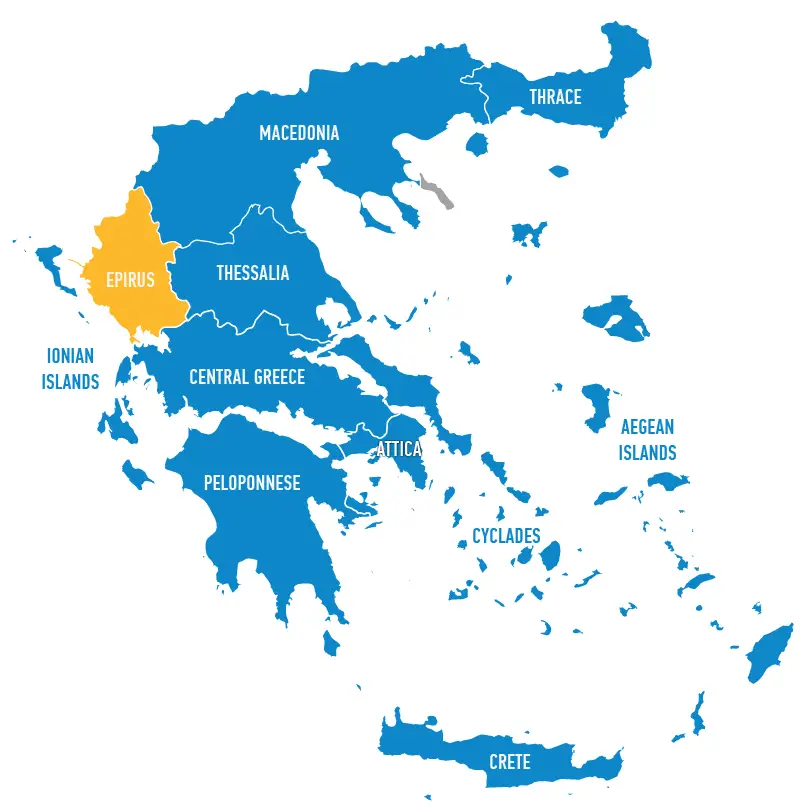
The highlighted section of the Epirus region where the Greco Italian war initiated.
Roatta’s directive called for a defensive posture in the Korista area. It also called for the seizure and occupation of the island of Corfu. Once a sufficient amount of reinforcements arrive in the theater, an advance from Epirus towards Athens was to commence.
Greece is Ready
Greece took pre-emptive measures in mid-1940 in anticipation of a war against the Italians. These steps included calling up the reserves and secretly creating ammunition and supply points near the Albanian border.
Perhaps the most significant Greek preparations was the redeployment of a large number of its troops from the Bulgarian border. Up till then, Bulgaria was their biggest threat. Greece moved the troops towards the western portion of the country to confront an attack by the Italians. Furthermore, after the onset of the Greco Italian War, it became apparent that Bulgaria was not going to attack. Greece stripped many of their ‘battle worthy’ divisions from the Bulgarian frontier and into battle against the Italians.
A grouping of fortifications known as the “Metaxas Line”, created to help defend against a potential Bulgarian attack remained manned. However, inexperienced troops or units manning requiring rest or refit from fighting in Albania manned the Metaxas Line. This enabled Greece to rotate and infuse fresh troops into the fray against the Italian military in a timely fashion. This became a critical advantage during a fight that soon turned into a bloody battle of attrition.
Numerical Superiority
It is challenging to get an accurate number of troops who participated in the Greco Italian War. Particularly at the onset. Some include the total Greek “reserve” forces. These forces were positioned a distance from the Albanian border but called forward very quickly once the Italian attack began. Others do not.
For propaganda reasons, the Italians and Greeks ‘massaged’ their reported number of troops fighting in the Greco Italian War to bolster their view of the conflict. The Greeks tended to under-report the number of their men fighting to help buoy the “David versus Goliath” aspect. The Italians were inclined to exaggerate the number of troops pitted against them to help justify the outcome of the battle. A commonly held position today is that the Greeks held a numerical advantage during the first months of the war. The Italians finally gaining a quantitative dominance in January 1941 until the end of the fighting.
The drums of war been beating in the ears of Mussolini reached their crescendo during the autumn of 1940. The Italian army stood by at the ready. A mere order is all that awaited to send them into the heart of the battle. That order would come during the early morning hours of 28 October. It would be the bloody Greco Italian War.
Special thanks to Dennis Hussey and Jeff Leser for their help in editing the article. Your time and work are much appreciated. Thank you both.
Referenced books available on Amazon:
The Hollow Legions: Mussolini’s Blunder in Greece, 1940-1941: Mario Cervi
Heroes Fight Like Greeks, The Greek Resistance Against the Axis Powers in WWII, Ronald J Drez
Mussolini and his Generals: The Armed forces and Fascist Foreign Policy, 1922-1940, John Gooch
Hitler: Ian Kershaw
